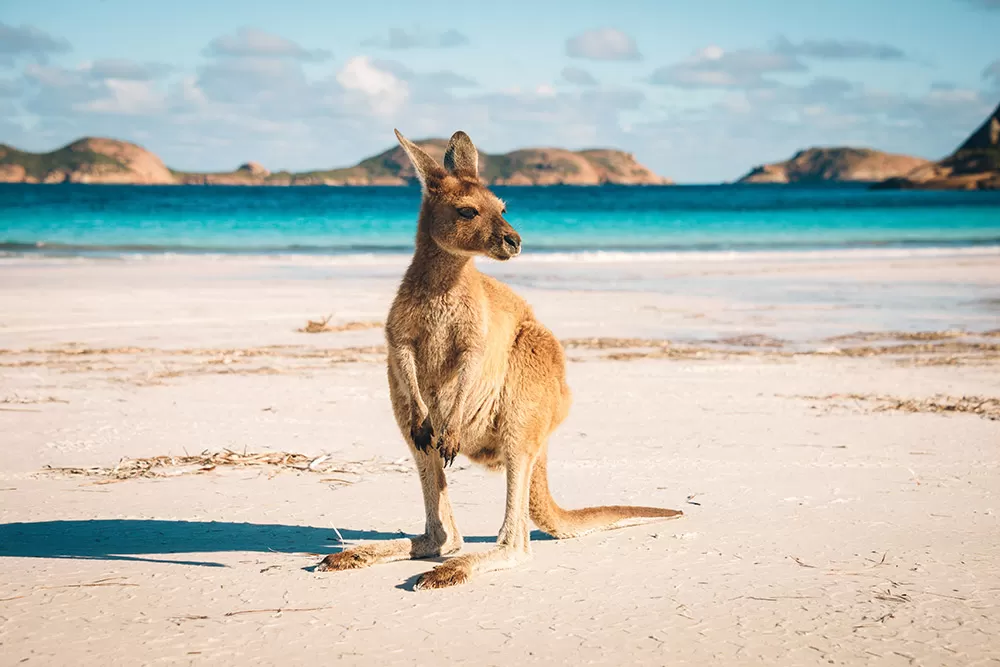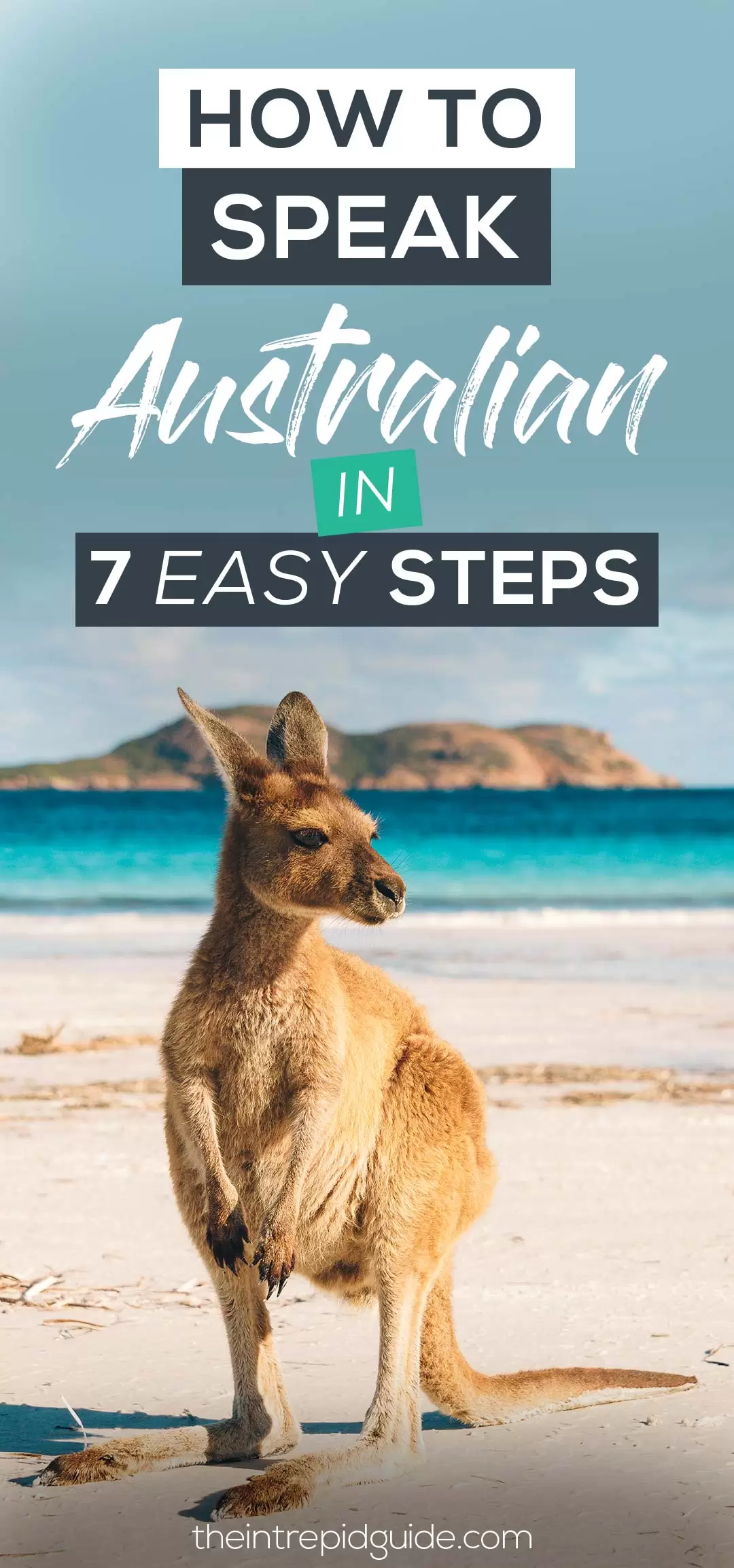Learn how to speak Australian and nail the accent with this easy step-by-step guide. Plus, you’ll learn most common Aussie expressions and words. You’ll be talking like an Aussie in no time. Fair dinkum!
Having a fond appreciation for languages I’m stoked (slang for excited) to write about my mother tongue; Australian English and of course the Australian ‘Aussie’ accent. In just 7 easy steps, you’re going to learn how to speak like an Australian.
As mentioned in my previous post on the Dutch spoken in Belgium, Australian English differs from other varieties of English in vocabulary, accent, pronunciation, register, grammar, and spelling.
During my encounters abroad, people have referred to my accent as being “exotic” and even “sexy”. This always surprises me as most people consider French to be the sexiest accent. To be placed in the same category as the French would shock most Australians.
We Aussie’s are masters of shortening words by whacking an “o” after the first syllable of most words and then ignoring the rest of the word. For example, a service station becomes servo, garbage man becomes garbo. Not to mention our inability to pronounce the letter ‘r’. If I didn’t know any better, I’d say all this abbreviating was in an effort to save time, but the real reason is much more interesting.
To understand where Australia obtained its colourful accent and lexicon we must first go back to its origins.
A Brief History of the Australian Accent
After the loss of its American colonies in 1783 and in an effort to gain more foreign territory, the British Government sent 11 ships to New South Wales in 1788 to establish a new penal colony. A steady stream of ships was sent all over Australia establishing new townships up until 1848 when convict transportation ended.
Of the convicts, a quarter was Irish, arrested in both Ireland and in Great Britain. They either spoke no English at all, or spoke it poorly and rarely. Other significant populations of convicts from non-English speaking parts of Britain, included the Scottish Highlands and Wales. This melting pot of people from different linguistic origins set the stage for the birth of a new accent and variation of English.
Interestingly, the earliest form of Australian English evolved from the children of the colonists born into the colony in New South Wales. This first generation of children created a new dialect that was to become the language of the nation. Having been exposed to a wide range of dialects from all over the British Isles, Ireland and South East England, the new dialect expressed peer solidarity. Even when new settlers arrived, this new dialect was strong enough to triumph over other speech patterns.
The accent evolved even further in the 1850s with the beginning of the Australian gold rushes. According to linguist Bruce Moore
The major input of the various sounds that went into constructing the Australian accent was from south-east England.
This is because of the large wave of immigration, roughly 2 per cent of the population were from the United Kingdom.
Australian English has many things in common with several British English dialects such as Cockney, Scouse, Glaswegian, and Geordie this includes the use of the word mate. Oh, and remember the use of the suffix –o, I mentioned earlier? Well, that originates from Irish Gaelic.
Many words used by Australians today were at one time used in England but are either no longer used or have changed their meaning. For example, a paddock in Australia is a field, whereas in the UK it means a small enclosure for livestock.
Want to speak Australian? Let’s have a look at the typical traits of the Aussie accent and slang.
Here are 7 steps to speaking like an Australian.
1. Drop the R sound from the end of words and replace it with an “ah.”
For example, instead of “forever,” you would say “forev-ah.”
2. Keep your intonation steady, quick, and soft.
Picture a long, constant stream of words coming out as if the entire sentence is one whole word. To do this, try not to move your tongue so much. One vocal coach suggests imagining your tongue laying over an exercise ball.
3. Soften the T at the end of words.
When you say the word, “right,” you want to sound more like “r-eye.”
4. Cut off the G from words ending with “-ing”.
Generally, the Australian accent cuts words short. So that “catching” sounds like “cat-chn.”
5. Raise your voice towards the ends of the sentence.
This is sometimes called the “Australian Question Inflection,” this little trick is common in everyday Australian speech. Simply raise your voice towards the end of a sentence as if you were asking a question.
And if you want to use a bit of slang, try doing these 2 things
6. Shorten the word and add an “-ie”
There are a lot of Australian slang words that are simply shortened and made to rhyme with “see.” This is where the phrase “barbie” (for barbeque) comes from. Other examples include:
Pressie – Present
Brekkie – Breakfast
Mozzie – Mosquito
Sunnies – Sunglasses
7. Use “as” at the end of sentences to provide emphasis
For example, “That movie was sweet as, mate!”
To sound really authentic, here are some slang words frequently used:
Arvo: Afternoon
Barbie: Barbeque
Bogan: Redneck, an uncultured person
Chockers: Very full
Esky: Cooler, insulated food and drink container
Fair Dinkum: true, real, genuine
Mozzie: Moosquito
Pash: A long passionate kiss
Ripper: Really great
Root: Seexual intercourse. This one can get really get foreigners in trouble. There are numerous stories about Americans coming to Australia telling people how they love to “root for their team.” If you come to Australia, you would want to use the word “barrack” instead.
She’ll be right!: Meaning everything will be all right
Sickie: Sick day. When you take a day off work when you are not actually sick, it’s called chucking a sickie.
Slab: 24-pack of beer
Sook: To sulk. If someone calls you a sook, it is because they think you are whinging
Stubbie holder: Koozie or cooler. A stubbie holder is a polystyrene insulated holder for a stubbie, which is a 375ml bottle of beer.
Spit the dummy: Have a sudden tantrum
Stoked: To be excited
Ta: Thank you
Togs: Swim suit
Tradie: A tradesman. Most of the tradies have nicknames too, including brickie (bricklayer), truckie (truck driver), sparky (electrician, garbo (garbage collector) and chippie (carpenter).
Ute: A utility vehicle, pickup truck
Whinge: to whine
Woop woop: An isolated place
And my favourite Aussie expression:
To have few kangaroos loose in the top paddock: Someone who is eccentric or not very bright.
Want more? Here are hilarious and commonly used Australia expressions.
Visiting Australia? Don’t miss these travel guides!
- 43 Best Things to Do on the Mornington Peninsula [By a Local]
- 19 Best Melbourne Street Art Locations & Map | The Ultimate Guide [By a Local]
- 23 Best things to do in Phillip Island, Australia [By a Local]
- Phillip Island Penguin Parade: 23 Essential Things You Should Know Before You Go
- A Local’s Guide to Point Nepean National Park: Read This Before You Go!
- Darwin to Alice Springs: 10 Incredible Things to See in Outback Australia
- Sydney Itinerary: 25 Fun Things to do in Sydney on a Budget
- Sydney Harbour Bridge Climb Review: Ultimate Guide to Climbing Sydney Harbour Bridge
- Ultimate Guide to the Best Whale Watching in Hervey Bay, Australia
- Australian Slang: 31 Hilarious Aussie Expressions You Should Use
Like it? Pin it for later
 Like it? Pin it for later!
Like it? Pin it for later!

Sources BBC, Mental Floss, WikiHow, Wikipedia
Over to you!
What strange Aussie words have you heard?
Let me know using the comments section below or join me on social media to start a conversation.
Thanks for reading and I hope you enjoyed this post.
Like what you see? Subscribe using the form below to have all of my posts delivered directly to your email.


 Like it? Pin it for later!
Like it? Pin it for later!
3 comments
I love living in Oz, surrounded by that wonderful accent (even in my child)- and then I visit the US and everyone says I have an accent now… Hey?
Haha I’ve only been living in London for 3 years and when I last went back home a guy asked me where I was from! He said I didn’t sound like and Aussie at all. Yet, in London everyone says how strong my Australian accent is! Can’t win 😛
Struth mate!!! This site is grouse love! Howz it hangin? See ya later aligator …. just a few more slang bits for the collection. Onya!!
Comments are closed.